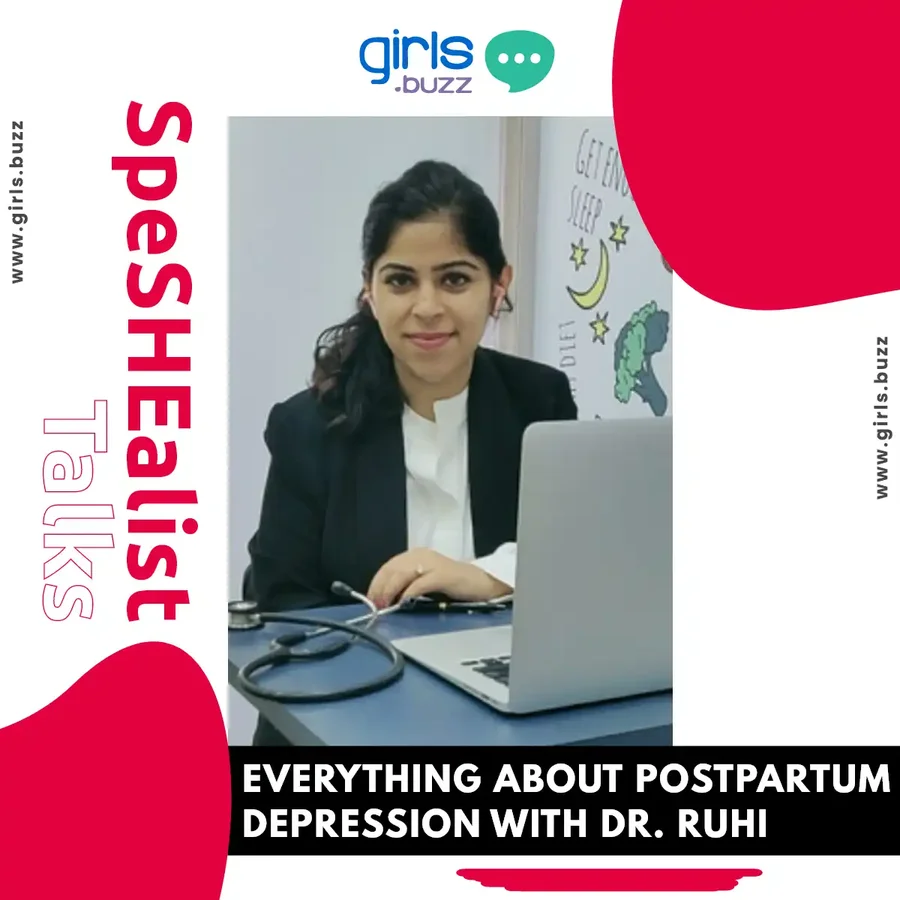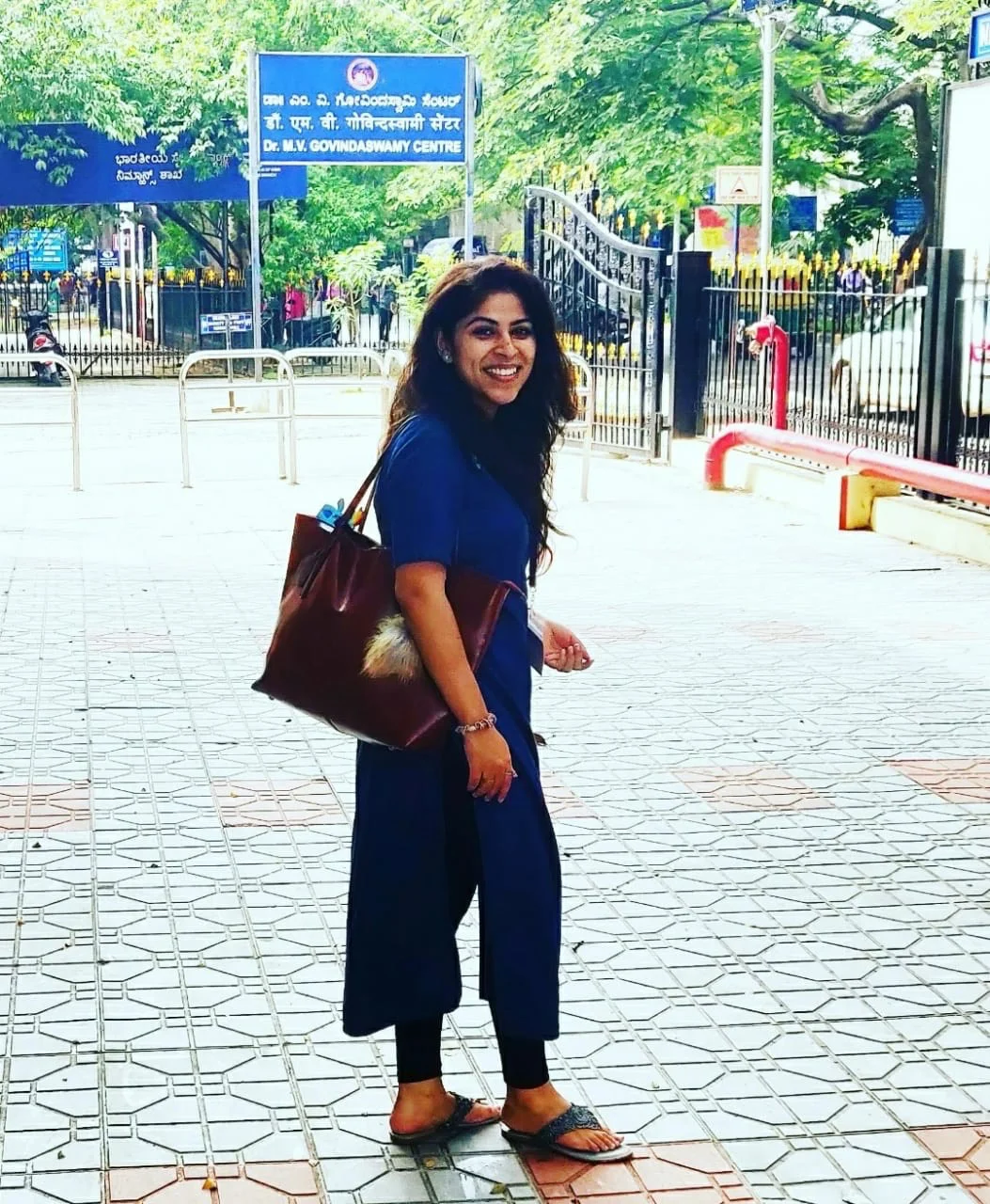Decoding Postpartum Depression and Body Image Issues Post Pregnancy with Dr. Ruhi
14 minuteRead

By Ruchi Sharma
Pregnancy and giving birth to a child is undoubtedly the most beautiful phase of a woman’s life. There is nothing more beautiful than knowing you brought a new life into this world and then slowly that new life becomes your whole world! But at the same time, the whole journey might lead to many emotional and physical changes which can affect a new mother or a pregnant woman at multiple levels. Postpartum depression is often confused with baby blues and if left undetected can have hampering effects on not only the mother’s health but her overall well being. As we know mental health is as important as physical health. And to know more about it, we have Dr. Ruhi Satija, a psychiatrist on board, who will be telling us all the intricacies about postpartum depression as well as body image issues post pregnancy.
Dr. Ruhi is not only an expert psychiatrist, but she is a counselling therapist and a mind wellness coach too. Her way of explaining things is something that makes it very easy to understand for everyone, and that’s why she’s a true pro in helping people.
So, without further ado, here’s presenting the detailed conversation we had with Dr. Ruhi where we got to know more about her and she shared with us all aspects about postpartum depression, how one can know its symptoms, how family can help and a lot more. Let’s not wait any longer, scroll down to read this special edition of SpeSHEalist Talks.

- Hello Dr. Ruhi, we are excited to have you on Girls Buzz, we would love to know more about you.
Hello I am Dr. Ruhi Satija, I am a psychiatrist, counselling therapist and a mind wellness coach, I am based in Mumbai, I have my own practice as well as am associated with Cloud Nine hospital, Mumbai where I work as a perinatal mental health expert which is pregnancy and related women’s mental health issues. I am also the Founder and Managing Director of Decoding Mental Health Pvt. Ltd., the company which undertakes corporate training as well as training for psychologists and other mental health professionals in the form of workshops or various courses. I am associated with the International foundation of Maternal and Child health where I provide remote consultation as well as awareness lectures for the people who cannot afford treatment. I am also a new mum, I have a one and a half year old baby boy and I am totally loving it!
- We saw on your Instagram bio, that you are a psychiatrist, therapist as well as a coach! Can you tell us more about the difference between each of these?
I am a psychiatrist, counselling therapist and a mind wellness coach and trainer. The difference between the three is something that I get asked on a daily basis. A psychiatrist is a doctor, someone who has done MBBS first which is basically graduation in allopathic medicines and after that they go for post graduation or specialisation in psychiatry. They are providing medications, the diagnosis of mental health issues and sometimes some psychiatrists also get trained in counselling therapies like myself so they provide medication and counselling sessions together.
A psychologist however or a counsellor in general terms is someone who has done graduation in science, BA, BSc, otherwise they are not allowed to give medication because they do not have a medical background. They only provide counselling or psychological testing which is required for assessment of the diagnosis that has been made.
A trainer is someone who has taken specialised training in teaching mental health techniques or various issues allied. What they do is they take workshops or training programs where they teach people whether they have mental health issues or not but basically working towards the preventive side of mental health issues and giving skills to people where they can learn how to take care of their own mental health. Sometimes they are specialised for example in stress management, mindfulness based CBT etc.so the approach changes with the specialisation that they have but essentially they do not provide medication or a diagnosis. A trainer is just somebody who has learnt some skills related to mental health issues and teaches them via workshops or some programs.
- Coming to our topic of the day, what exactly is postpartum depression and are there some classifications for it? What can be some of the most noticeable symptoms that one can observe to know if they themselves or their dear one is suffering from postpartum depression?
Postpartum depression is a mental health issue where symptoms of depression occur after delivering your baby. The symptoms can be extreme sadness and feelings of loneliness and hopelessness, crying spells where the patient is not able to control their own emotions and cries continuously or profusely. Then having feelings of not being a good mother or not being able to provide for the baby effectively, the feelings of irritability and anger and snapping out at the partner or the family, sometimes for very small trigger or no trigger at all, the feeling of loneliness or feeling abandoned sometimes having sense of guilt which can be very very delusional which means that the mother will feel that she is not good enough, she is not providing enough whereas it would be very contrary to the fact that she was a good mother in the present. There are symptoms of Insomnia or not being able to sleep properly, there will be symptoms of loss of appetite or emotional eating as well and it is a very difficult time for a new mother because practically anyway there is a lot of adjustment going on in her life. Emotionally it takes a huge turmoil which not only affects the mother but it affects the relationships as with the baby and its impact in the relationship with their partner and the family members as well. If it goes undiagnosed the patient starts having resentful feelings towards the baby and regrets sometimes having a baby because the changes that they see in their life is really overwhelming.
On an average it is noted that one in seven women suffer from Postpartum depression, however the numbers are not very correct because often postpartum depression goes undiagnosed or misdiagnosed because people are not aware of it. They see it as a normal phenomenon and is often confused with Postpartum blues.

- Nowadays there is this new term that is often referred to i.e. Peripartum depression, is it the same as postpartum depression?
Peripartum depression is signs of depression, similar symptoms, but which occur during pregnancy because of hormonal imbalance and changes. Postpartum depression the symptoms start after delivering the baby so the symptoms will be quite similar but the duration and also the beginning point which is when the symptom started is essential in understanding the difference between the two .
- . A woman undergoes constant emotional and physical change during pregnancy, what can be the early and subtle signs of depression?
Some of the early signs in depression in postpartum could be insomnia, sleep issues, change in appetite, sometimes females even lose their appetite. There is emotional instability where there are episodes of excessive crying sometimes without any trigger or sometimes the emotional reaction is much more than the trigger present. There is also a sense of hopelessness and worthlessness, feeling of inadequacy where you know one feels that she is not a good enough mother, she is not able to do enough that is required.
There could also be physical symptoms like feeling weak, some body pains, random nicks and pains and not finding the energy to do things. If it is excessive, people also find it difficult to get out of bed. So these are all the subtle and early signs of depression that we can see.
- Medications are something which new mothers want to be very careful on, does postpartum depression always require medication? And if medication is necessary, does it have any health impact on a lactating mother?
There is a lot of bias as well as misconceptions about psychiatric medications. People believe that the moment someone will go to a psychiatrist, they will be put on medication which is actually far from truth. Whether they prescribe medicine or not depends on the severity level of the symptoms and especially when we are talking about pregnancy or postpartum especially if the mother is still breastfeeding, medication is always the last option. First thing that we do when we see a depression patient is to the assessment of the level of depression that they have or the severity of the depression that they have. An initial recommendation is always lifestyle modification and supportive counselling therapy. However in some cases if it has been too late since the patient started having depression and it they come to the doctor or the symptoms are so severe that the doctor has already assessed that the counselling alone will not not be enough we recommend medications. Of course if the mother is breastfeeding or is still pregnant medication is given very cautiously, thankfully with the advancement in science, today we have a lot of good medications that are safer in pregnancy and if given under proper supervision it is not that bad for the mother and definitely not bad for the baby. What we need to understand is a lot of bias comes from limited knowledge that people have and especially asking from other friends and family members instead of from professionals that is when these confusions occur. So many times it happens that once a doctor has prescribed the medication people do not follow up and they keep on taking medicine on their own which can be very unsafe. So, if you have been put on psychiatric medicine it is very important whether you are pregnant or not that you constantly follow up with the doctor and go and check and of course depending on the symptom the doctor will keep on changing the dose as is required at the moment. It is not like whatever dose is fixed on the first day has to be continued continuously. So it changes depending on your improvement level and your tolerance level.
- How does therapy help women in such cases? Are there some simple ways with which the family can help new mothers come out of it?
Therapy or counselling is a wonderful way of treating mental health issues. In counselling what we do is we work on the limiting thoughts or the way we see things which are actually creating the negative thought patterns or the negative emotions which add up to the depression or sometimes are also the reason of getting into depression. When it comes to the family members, of course the support system is required. What family can do is first of all instead of judging the patient or keep on telling them that this is what they need to do or this is what they should try, we support them unconditionally. Be there for them as they need. I often see that the family members will say to the patient that go and for yoga, try to be happy, go and join some dance classes and it would help, it doesn't. In fact it puts even more pressure on the patient and the feeling of that I am not willing now. There is always the guilt factor associated with patients of Mental Health issues where they know that they are not able to contribute as much as it would be required from them so putting even more pressure on them is very detrimental for their health. So, when talking about family members or their partners what you need to do is give them the space, give them the time to heal and of course be there as much as you can in the way that they ask instead of putting your own judgement in the picture.

- Are there any general mistakes close ones might be doing which may trigger this depression or make it worse?
The common triggers for someone who has Postpartum depression are often coming from family members or their partners. The fact that sometimes people tell them that they can get over it by trying something like yoga, meditation or trying some Hobby classes or going for a walk itself is a huge trigger. Apart from that something with family members tell them, example you know ‘you are thinking negative, that’s why it is happening’, ‘you are always like this you always see the negative things that's why it’s happening’, that can be very very devastating for the patient. Someone who doesn't even know what they are going through sometimes and why they are going through. Someone comes telling them that they are the reason for it, there is nothing worse than that. Apart from that family members expecting the patient to be able to take up the responsibility we often hear that now that you are the mother is no way that you can back down, there is no way that you will not do what is the required out of you is itself a trigger because someone who has depression cannot do a lot of things that are required of them, and it is not their fault absolutely. Not being able to help, not being able to adjust with them, not being able to provide them that safe space to come and talk and tell that I am suffering and this is what I am going through itself can be a huge trigger.
- Sometimes women are concerned that their depression might return back post or during pregnancy, if they had any history of depression in the past. Is that true?
Just like any medical disorder, the psychiatric disorders have a genetic basis. So yes if you have had a history of depression it is possible that you will have a relapse which means that symptoms of depression can come back during pregnancy or postpartum. But if you have undergone treatment with medications or therapy, it reduces the chances of relapse to an extent.
- Due to tremendous physical changes a woman’s body goes through, post pregnancy, one might feel very insecure about their weight or appearance of stretch marks. Are there some suggestions through which one can overcome that apprehension?
Body image issues or the concerns about the weight or the stretch marks, are one of the most common symptoms of the stress that we see Postpartum. The unimaginable society standards of beauty and of course the bias that we see in society adds to it. The best thing to do for yourself is first of all understanding that there is nothing more difficult or beautiful than creating a baby. So if you have gained some weight or even if you have some stretch marks it's ok. I always call them the beauty marks. I have them and I am proud of them. It’s just like you know a warrior has the marks of victory on their bodies. This is a battle that we have won. So, never feel that this is making you less in any way. But of course for some people the weight gain can be really stressful so some of these you know positive thoughts might not be enough. I would suggest that if it is stressing you or causing some issues in your life, go to a mental health professional, talk about it, take some counselling sessions, work on your body image issues. Because definitely if somebody is really distressed about it, it is not just their pregnancy weight, there might be underlying trauma, maybe of childhood, maybe of you know some mindset they have faced because of it. Maybe the current partner or family members are triggering them by saying somethings or commenting on their weight, it might be making it even worse. So go to a professional, talk about it and see what’s exactly going on and making you so distressed about something like this.
- What are the few things friends and family can do to ensure the new mother doesn't get conscious about her physical changes?
The best thing that families or friend members can do for someone who has been pregnant and is suffering from various issues is not talk about it, do not point it, do not talk about remedies, do not talk about some solutions about it, because it can be very triggering for the patient. I understand that sometimes we give the advice thinking that we are trying to help the patient or we learn something new about weight loss and we want to share but we also have to understand that the state of mind in which the other person is there might not be correct at that time. Somebody who is fighting with weight issues even if you are telling them a remedy and even if it is something that really works, might not necessarily be taken in a positive way. It might actually trigger them and they might actually see it as a comment or a remark on the fact that they are not in their correct weight right now. So the best thing is know your boundaries and do not step on them and give them the space. If they want to talk about it, if they ask for remedies, definitely tell them. But, if they are not talking about it the best is to leave the person and let them deal with it in the best way possible. And if you can already see that they are under distress instead of you becoming someone who helps them because you are not qualified for it. Try to find a professional, a nutritionist or a psychologist, a counsellor or a psychiatrist who can actually guide the person of what should be the right way of losing the weight or whatever issue they are facing.

- There’s this myth that one faces this depression immediately within a few months after pregnancy, is that true?
Postpartum depression starts after 2-3 weeks of delivery. Yes, that is true however it is not necessary that just because you had a delivery you are going to have depression. For depression to occur whether postpartum or peripartum there are multiple factors involved, we have a biopsychosocial model in Mental Health disorders which means that first of all biologically or genetically there should be some element in your body which makes you more prone to get the disease for example like we see in diabetes that if you have a relative who is diabetic in the family your chances of getting diabetes increase, similar for heart diseases. So, its the same in any medical disorder. And just like them there is a psychological and social model as well. For example, psychologically we say that your personality type, your thinking patterns or the way that you behave also adds up to the mental health issues. Somebody who is more impulsive, somebody who is addicted to different substances, somebody who tends to overthink, somebody who tends to think things negatively will have more chances of getting depression compared to the others, but alone this will not cause depression, it has to be a combination of biopsychosocial. Social aspect is your surroundings, your family, your friends, the environment that you are in, if all of 3 add up to some extent and cause that in balancing your mind of the neurochemical that's when you get depression, so it is not necessary that only delivery is going to cause the depression.
- Another myth says that postpartum depression can happen only in women. How true is that?
Postpartum depression happens of course in the men post delivery but definitely it is noticed that men also suffer from depression and anxiety in the postpartum period. Especially with the roles of fathers changing in the current society and more and more roles taken up by the fathers of taking care of the baby as well as the partner definitely adds up to this factor. And also the conditioning of the men that they do not share their problems easily and sometimes they don't even recognise that they are suffering from something emotional is a contributing factor to it. So, definitely we see that there is depression and anxiety and other stress disorders occurring in males as much as females in postpartum period.
- We are sure our audience here got many of their questions answered! Before we wrap up, what would be the one piece of advice you would like to give all expectant and new mothers reading this?
If I have to give one advice to anyone who is expecting or have recently had a baby, I would really say that you are the person who is taking care of this baby, you are the one the baby depends on and feel the world through so whatever you are doing, whatever you are feeling has an impact on the baby. So don't just think about taking care of the child , think about yourself as much. Make sure you are one of your priorities in life. Make sure that you take out time for yourself and do little bit of self care in whatever form you can so that you do not forget yourself in the process and most importantly if you feel that something is going wrong and you are suffering do not delay and do not wait for other people to validate your feelings or tell you, you know that it’s okay if you are not okay. Accept it on your own, take the responsibility of your well being and make sure that you ask for help because help is always around.
Thank you Dr. Ruhi for clearing all the doubts and sharing such wonderful advice with us. It's truly important to promote mental health awareness. If you have any more questions, you can reach out to Dr. Ruhi on her instagram id @dr.ruhi.decodingmentalhealth.
Write, Record and Answer! Consume Unlimited Content! All you need to do is sign in and its absolutely free!
Continue with one click!!By signing up, you agree to our Terms and Conditions and Privacy Policy.










